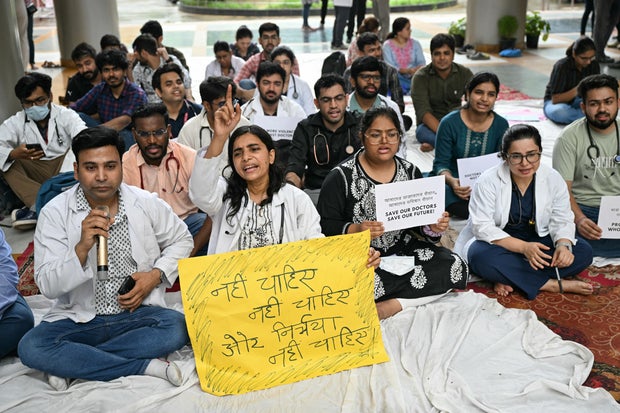Indian doctors in government hospitals across several states halted elective services “indefinitely” on Monday to protest the rape and murder of a young medic.
The 31-year-old woman’s brutalized body was found bearing multiple injuries on Friday in a state-run hospital in West Bengal’s Kolkata, where she was a resident doctor.
A subsequent autopsy confirmed sexual assault and homicide.
Police have detained a man who worked at the victim’s hospital helping people navigate busy queues, according to local media reports.
Demonstrations by doctors demanding justice and better workplace security that initially began in Kolkata have now spread to other parts of the country.
Doctors say they face additional threats of workplace violence from angry family members of patients, especially after delivering bad news.
MONEY SHARMA/AFP via Getty Images
“There should be stringent security measures in hospitals and CCTV cameras should be installed,” said Sarvesh Pandey, from the Federation of Resident Doctors Association.
Pandey added that the protesting doctors’ demands included a specialised law protecting healthcare workers from violence on the job.
“There are incidents every day where doctors are assaulted,” said Pandey.
A survey by the Indian Medical Association found 75 percent of doctors in India had faced some form of violence.
Disturbing trend
An average of nearly 90 rapes a day were reported in India in 2022, according to data from the National Crime Records Bureau.
That year, police arrested 11 people after the alleged brutal gang rape and torture of a young woman that included her being paraded through the streets of Dehli. Also in 2022, a police officer in India was arrested after being accused of raping a 13-year-old girl who went to his station to report she had been gang-raped.
In March, multiple Indian men were arrested after the gang rape of a Spanish tourist on a motorbike trip with her husband.
In 2021, a 34-year-old woman in Mumbai died after being raped and brutally tortured.
Large numbers of rapes go unreported due to prevailing stigmas around victims and a lack of faith in police investigations.
Convictions remain rare, with cases getting stuck for years in India’s clogged-up criminal justice system.
The notorious gang rape and murder of an Indian student made global headlines in 2012.
Jyoti Singh, a 23-year-old physiotherapy student, was raped, assaulted and left for dead by five men and a teenager on a bus in New Delhi in December that year.
The horrific crime shone an international spotlight on India’s high levels of sexual violence and sparked weeks of protests, and eventually a change in the law to introduce the death penalty for rape.


